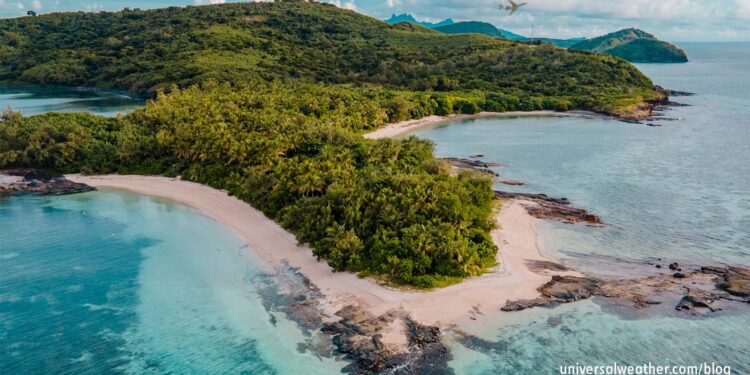Business Aircraft Operation to Fiji – Basic Information for Operators

With advance preparation business aircraft operations to Fiji tend to go very smoothly. It’s important, however, to be very clear and precise with regards to any changes to the schedule, crew, or passengers and to ensure that you have a stamped gen dec from your last departure point available.
The following is an overview of what you need to know when planning a trip to Fiji:
1. Are there many available airports in Fiji?
Nadi (NFFN) is an Airport of Entry (AOE), and Suva (NFNA) is an AOE on request. There’s also a private resort airstrip at Laucala Island (NFNH) with a 3,743-foot runway, which is only available for operators who are going to this resort. NFNH is not an AOE, and you must still clear customs into and out of Fiji via an AOE.
2. What are airport and CIQ operating hours?
NFFN is a 24-hour airport with 24-hour Customs, Immigration, and Quarantine (CIQ). NFNA operates 0530-2100 local, but overtime for both the airport and CIQ is available with 48 hours’ notice. While short-notice requests are possible for NFNA, keep in mind 24 hours’ notification is a minimum requirement for CIQ.
3. Are landing permits required?
Landing permits are required for both private non-revenue and charter (non-scheduled commercial) operations. Private non-revenue operators need to provide certificates of aircraft registration and airworthiness, worldwide insurance with 3rd-party liability coverage, crew and passenger information, and a local business contact. Charter operators provide the same information, along with an air operator certificate. Permit lead time is 72 hours for private non-revenue flights and 14 days for charter operations. Fiji Civil Aviation Authority (CAA) is responsible for processing permits and may consider short-notice requests. Permits are valid for +/- 72 hours.
4. What are some landing permit considerations?
CAA is particular about schedules and any changes to trip details. If you are changing date, crew, passengers, origin or destination, routing, or flight information regions (FIRs), your permit must be revised and revalidated by CAA. It’s important to notify CAA of any changes to the passenger list. If any passengers plan to remain in Fiji and fly out later commercially, this must be approved by CAA. These notifications to CAA must be done at least 24 hours prior to your departure. CAA always requires a local business contact with any permit request. If you’re traveling for vacation or leisure purposes, you may use a local resort as your contact for landing permit purposes.
5. Are there ground handling considerations?
Check with your ground handler, in advance, on availability of services and ground support equipment. Fuelers in Fiji prefer 24 hours’ advance notification for fuel uplifts. Airports in Fiji only have towbars available for certain aircraft types. So, if you don’t plan on taking a tow bar, check in advance that one is available. Credit for fuel and services at NFFN and NFNA can be arranged in advance, and aviation fuel cards are usually accepted. If for some reason credit is not available, you may also use consumer credit cards. For short-notice trips it’s recommended to always have consumer credit cards on hand, and you should keep these available as a backup for settling handling and airport fees.
Vehicle access to the ramp is possible in Fiji. However, this is by special permission, and a vehicle search will be required. Vendor vehicles may also be brought airside with a similar screening process.
6. What documentation is required upon landing?
When you arrive in Fiji, it’s important to have a stamped gen dec from the last airport at which you cleared CIQ. If you arrive without this, customs will re-vet all crew members and passengers, and this can cause delays of several hours. You’ll need to present six copies of your gen dec. An official report form must be completed by crew members on arrival, and note that your ground handler can not complete this in advance. Customs only accepts completed originals of this form. Crew members must also complete a crew declaration form at the arrival hall. CIQ is always cleared within the arrival hall in separate lines from scheduled commercial passengers. Onboard clearance is not possible in Fiji. Always check on visa requirements with your ground handler as visas, when needed, must be obtained prior to arrival.
7. Must certain documentation be forwarded in advance?
Fiji requires that crew and passenger details, hotel details, and insurance coverage specifics be forwarded prior to your arrival. This allows Fiji CIQ to check crew and passenger details against a “watch list” and to reconfirm landing permit information.
8. Will the cabin need to be sprayed prior to landing?
When you arrive at NFFN, your cabin must be sprayed with an approved pesticide, at top of descent, prior to landing. Empty spray cans must be handed to health authorities on arrival. If your cabin has not been sprayed at top of descent, local authorities will spray your cabin – with crew and passengers onboard – on arrival. It’s best to check with your ground handler on spray requirements prior to operating to Fiji.
9. Are there agricultural restrictions to be mindful of?
No fruit, plants or plant extracts, meat, or dairy products are normally allowed into the country. Leftover food onboard will be removed by quarantine staff upon arrival. If you have a need to bring certain food into the country, best practice is to check with your 3rd-party provider prior to arrival.
10. What are considerations regarding onboard pets or guns?
Bringing pets into Fiji is not problematic so long as prior arrangements have been made. If you have a requirement to bring guns and/or other weapons into the country, work with your 3rd-party provider well in advance to explore possibilities and processes for doing so.
11. May arriving passengers remain in Fiji?
Only passengers authorized to travel by the Ministry of Tourism and CAA will be permitted to disembark your aircraft in Fiji. Arriving business aviation passengers must depart on the same aircraft on which they’ve arrived unless prior approval has been granted. If you have passengers planning to remain in Fiji, it’s important to make this clear on your landing permit request to CAA.
12. Are there security concerns to take into account?
While Fiji is currently calm, political and economic uncertainties continue. Some night-time police checkpoints remain in place around major population centers. The security situation, especially in Suva, could deteriorate without warning.
Conclusion
Always pre- confirm availability of services and credit when operating to Fiji. As credit arrangements in this region can be inconsistent, it’s best practice to have consumer credit cards available as a backup for settling handling and airport fees.
Questions?
If you have any questions about this article or would like assistance planning your next trip to Fiji, contact Louis Smyth at louissmyth@univ-wea.com.




